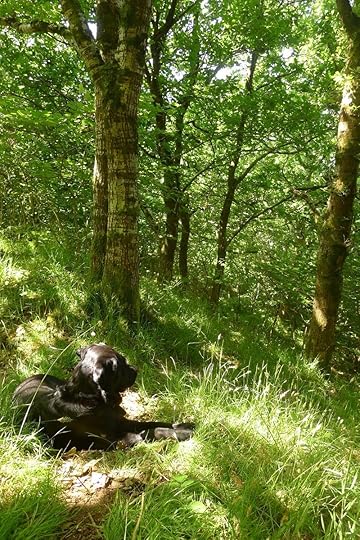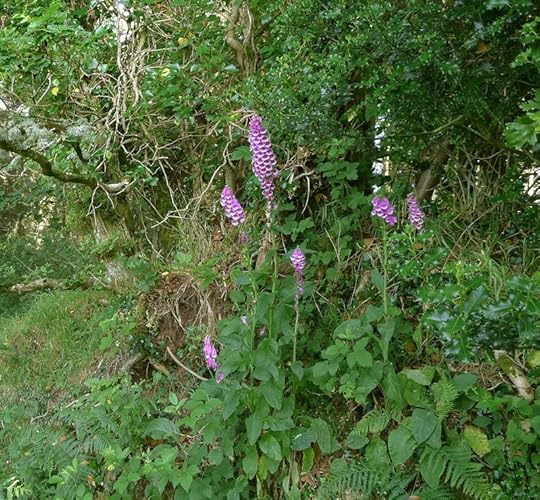Into the Woods, 20: The Deepwood (Part ll)
From The Wild Places by Robert Macfarlane:
"Before coming to the Black Wood, I had read as widely in tree lore as possible. As well as the many accounts I encountered of damage to trees and woodland -- of what in German is called Waldsterben, or 'forest-death' -- I also met with and noted down stories of astonishment at woods and trees. Stories of how Chinese woodsmen in the T'ang and S'ung dynasties -- in obedience to the Taoist philosophy of a continuity of nature between humans and other species -- would bow to the trees which they felled, and offer a promise that the tree would be used well, in buildings that would dignify the wood once it had become timber. The story of Xerxes, the Persian king who so loved sycamores that, when marching to war with the Greeks, he halted his army of many thousands of men in order that they might contemplate and admire one outstanding specimen. Thoreau's story of how he felt so attached to the trees in the woods around his home-town of Concord, Massachusetts, that he would call regularly on them, glady tramping 'eight or ten miles through the deepest snow to keep an appointment with a beech-tree, or yellow-birch, or an old acquaintance among the pines.'
"When Willa Cather moved to the prairies of Nebraska, she missed the
wooded hills of her native Virginia. Pining for trees, she would
sometimes travel south 'to our German neighbors, to admire their catalpa
grove, or to see the big elm tree that grew out of a crack in the
earth. Trees were so rare in that country that we used to feel anxious
about them, and visit them as if they were persons'....
"Single trees are extraordinary; trees in number more extraordinary still. To walk in a wood is to find fault with Socrates's declaration that 'Trees and open country cannot teach me anything, whereas men in town do.' Time is kept and curated and in different ways by trees, and so it is experienced in different ways when one is among them. This discretion of trees, and their patience, are both affecting. It is beyond our capacity to comprehend that the American hardwood forest waited seventy million years for people to come and live in it, though the effort of comprehension is itself worthwhile. It is valuable and disturbing to know that grand oak trees can take three hundred years to grow, three hundred years to live and three hundred years to die. Such knowledge, seriously considered, changes the grain of the mind.
"Thought, like memory, inhabits external things as much as the inner
regions of the human brain. When the physical correspondents of thought
disappear, then thought, or its possibility, is also lost. When woods
and trees are destroyed -- incidentally, deliberately -- imagination and
memory go with them. W.H. Auden knew this. 'A culture,' he wrote
warningly in 1953, 'is no better than its woods.' "
From Ross Anderson's interview of Robert Pogue Harrison (in The LA Review of Books):
Robert Anderson: Your book [Forests], particularly the end of
it, criticizes some of the basic ideas that motivate environmentalism
and ecology. In particular you argue that when we conceive of
deforestation as "loss of wildlife habitat," or "loss of nature," or
"loss of biodiversity," we're not capturing the full loss that we face.
First of all, what is the extent of that loss, and in your view has
ecology changed much in the past twenty years?
Robert Pogue Harrison: That's a good question. When I'm critical of
modern approaches to ecology, I'm really trying to remind my reader of
the long relationship that Western civilization has had to these forests
that define the fringe of its place of habitation, and that this
relationship is one that has a rich history of symbolism and imagination
and myth and literature. So much of the Western imagination has
projected itself into this space that when you lose a forest, you're
losing more than just the natural phenomenon or biodiversity; you're
also losing the great strongholds of cultural memory.
Is there a sound? There is a forest.
What is the world? The word is wilderness.
What is the answer? The answer is the world.
What is the beginning? A beginning is happiness.
What is the end? No one lives there now.
What is a beginning? The beginning is light.
- Bim Ranke (from "Trouble Deaf Heaven: Sonnet 29")
Terri Windling's Blog
- Terri Windling's profile
- 708 followers













